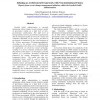Free Online Productivity Tools
i2Speak
i2Symbol
i2OCR
iTex2Img
iWeb2Print
iWeb2Shot
i2Type
iPdf2Split
iPdf2Merge
i2Bopomofo
i2Arabic
i2Style
i2Image
i2PDF
iLatex2Rtf
Sci2ools
124
click to vote
HICSS
2006
IEEE
2006
IEEE
Infusing an Architectural Framework with Neo-Institutional Theory: Reports from Recent Change Management Initiatives within the
Swedish public administration is currently undergoing radical change towards dynamic models of governance relying on a high level of intergovernmental collaboration. This high level of interoperability between governmental organizations and the subsequent quality of service for citizens and companies depending on the services provided by government is summarized in the vision-statement of the 24-hour government (24-timmarsmyndigheten). According to the primary actor‘s (Statskontoret) recommendation, this vision is to be realized through the application of web-service based technology, resulting in a Service Oriented Architecture (SOA). The purpose of this paper is to investigate a possible infusion of a previously developed architectural framework for change management with neoinstitutional theory. The results show that neoinstitutional theory could be used to infuse the architectural framework with aspects regarding primarily history and legitimacy, but also with an overall contrad...
Architectural Framework | Biometrics | HICSS 2006 | Neoinstitutional Theory | Swedish Public Administration | System Sciences |
| Added | 11 Jun 2010 |
| Updated | 11 Jun 2010 |
| Type | Conference |
| Year | 2006 |
| Where | HICSS |
| Authors | Johan Magnusson, Andreas Nilsson |
Comments (0)

